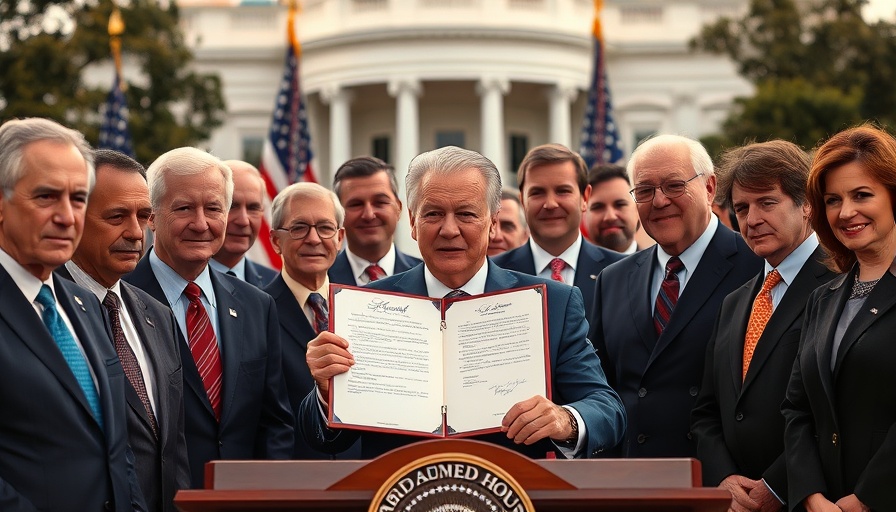
The Implications of the New Tax Cuts and Funding Bill
President Donald Trump made headlines when he recently signed a $3.4 trillion budget bill into law, a significant legislative achievement for his administration. Known as the One Big Beautiful Bill Act, this comprehensive package promises extensive tax cuts and new financial breaks, particularly benefiting tipped workers. However, the legislation is not without controversy, as it positions itself against a backdrop of economic uncertainty and public discontent.
A Political Victory or a Double-Edged Sword?
The enactment of this bill marks a pivotal moment for Trump during his second term, reinforcing his influence within the Republican Party. The bill's passage through Congress was no small feat, requiring an aggressive push from Trump to rally support among key lawmakers. The successful overcoming of narrow margins and unified opposition from Democrats underscores the high stakes involved in his legislative agenda.
Despite this victory, the bill is laden with political risks. Congressional Democrats have made it clear they intend to capitalize on any backlash stemming from the unpopular cuts to nutrition assistance and health programs. With the potential to displace around 11.8 million Americans from Medicaid, critics warn of a detrimental impact on those reliant on these essential services, particularly in rural areas where medical facilities are already under threat.
The Economic Forecast: Promise vs. Reality
Trump and his supporters argue that these tax cuts—an extension of those from his first term alongside additional breaks for tips, car loans, and overtime work—will stimulate an economic renaissance. Administration officials paint a hopeful picture, envisioning a country on the brink of significant economic growth, buoyed by generated tariff revenue and increased domestic energy production.
However, these optimistic projections clash with nonpartisan analyses predicting that the package will exacerbate the national debt. The bill's economic ramifications are under scrutiny, with polls indicating a lack of public support. Critics worry that this fiscal maneuvering could alienate voters ahead of the upcoming midterm elections, raising questions about the long-term sustainability of Trump's economic policies.
Special Tax Breaks: Who Benefits?
The budget package incorporates several targeted tax breaks. Among them, increases to the state and local tax deduction from $10,000 to $40,000 over the next five years stand out, providing substantial relief for many families. Additionally, expanded tax benefits for seniors and parents signal an understanding of the needs of these demographics, aiming to soften the impact of the larger budget changes.
As Trump frequently asserts, the motto of "promises made, promises kept" resonates within this legislative context, as he seeks to align his administration's actions with his campaign commitments. But these benefits come amid significant cutbacks that risk alienating vital voter bases.
Public Opinion and the Road Ahead
Despite the strategic framing of the new law as a win for economic progress, public sentiment has not shadowed the administration's optimism. Misgivings regarding the potential impacts on vulnerable populations have manifested in negative poll numbers, hinting at a growing discontent among the electorate.
As the midterm elections approach, how both parties handle this legislation could play a central role in shaping the political landscape of the country. Will Trump's supporters rally behind the narrative of economic growth, or will constituents call for accountability over the welfare of millions?
As the ramifications of this sweeping legislation unfold, it will be crucial to monitor not just the economic indicators but the social impact on American lives across the spectrum. The choices made today will resonate deeply in the elections and policy discussions of tomorrow.
Call to Action
Stay tuned as we continue to provide updates on how these legislative changes will impact you and your community. Understanding the implications of this bill is essential for navigating the future economic landscape. Your voice matters in this ongoing dialogue about financial policies and their effects.
 Add Row
Add Row  Add
Add 



Write A Comment